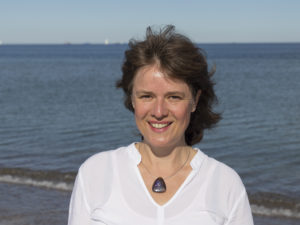Coming to you from Germany for #IamMex16
Dear all,
Let us end the week with another excellent presenter for our forthcoming #IamMex16 conference. Please meet Olivia Diehr from Germany and when you see her in Mexico, have a chat to her about sharing ideas and inspirations on the future of libraries; travelling, cooking, as well as being outside in nature. The conference in Merida should tick some of those boxes for Olivia :).

Olivia Karin Diehr was born in Rostock (Germany) and is the Head of the library at the Leibniz Institute for Baltic Sea Research since 2008.
Her library career started in 1988 in Rostock Public Library. After finishing school, she worked as a library assistant. During this time Olivia learned everything about shelf arrangement, checkouts, returns, and remembers the funny overdue excuses she sometimes heard!
From 1990 to 1994 she studied librarianship at the Leipzig University of Applied Sciences (HTWK), and graduated with a degree in librarianship in 1994. The job opportunities had changed completely after the German reunification. Olivia grabbed the opportunity and started working in academic libraries. From 1996 to 1999 she worked in a Governmental University of Applied Sciences (FHöVPR) in Guestrow, where she led this library for more than a year.
From 2000 to August 2008 Olivia served as a librarian at the Greifswald University Library, which is one of Germany’s oldest university libraries. At first she was in the acquisition department, and thereafter in the service department for 7 years. She was responsible for the websites of the university library and worked at the information and circulation desk.
Since August 2008 Olivia has held the position of head librarian at the Leibniz-Institute for Baltic Sea Research in Rostock-Warnemuende. Moreover Olivia finds serving marine scientists from all over the world thrilling beyond the regular library services. She keeps her fingers crossed for the various successful off shore sampling campaigns; She also established a kids library corner and last but not least her library tries to provide any required full text articles regardless of the effort.
Situated just at the Baltic Sea coast, Olivia’s library is certainly one of the most beautiful places to work.
Title:Â Identifying core marine science journals: factors of evaluation
Abstract: Journal articles are the most important sources for scientific information. More than 20 years after the “Berlin Declarationâ€, more and more journals are published open access. Due to this, the journals market is subject to a lot of change. The main aim is to gather information whether our subscriptions still meet the needs of our scientists. Key factors used to identify the core journals for marine sciences are displayed, at least for our scientists. Our institution is an interdisciplinary research facility. It specializes in the study of coastal oceans and marginal seas and is divided into four sections which focus on different research activities. Because of this, it is important to find a combined set of core journals which reflect the needs of all scientists involved. Recent budget cuts made it even more necessary to cut down on journal costs. Certain questions had to be answered during the evaluation process. Topics included in those questions were the definition of what core journals are, where our scientists publish their research, which journals they cite, available open access and institutional access to journals specialized in marine sciences, and the costs of journals.
Social media:Â Leibniz Institute twitter account @Ostseeforschung
Leibniz Institute Facebook page https://de-de.facebook.com/leibnizinstitutfuerostseeforschung
Remember to include us in your tweets and retweets @Iamslicorg and use the hashtag #IamMex16
Posted on behalf of the communications team by Stephanie Ronan




